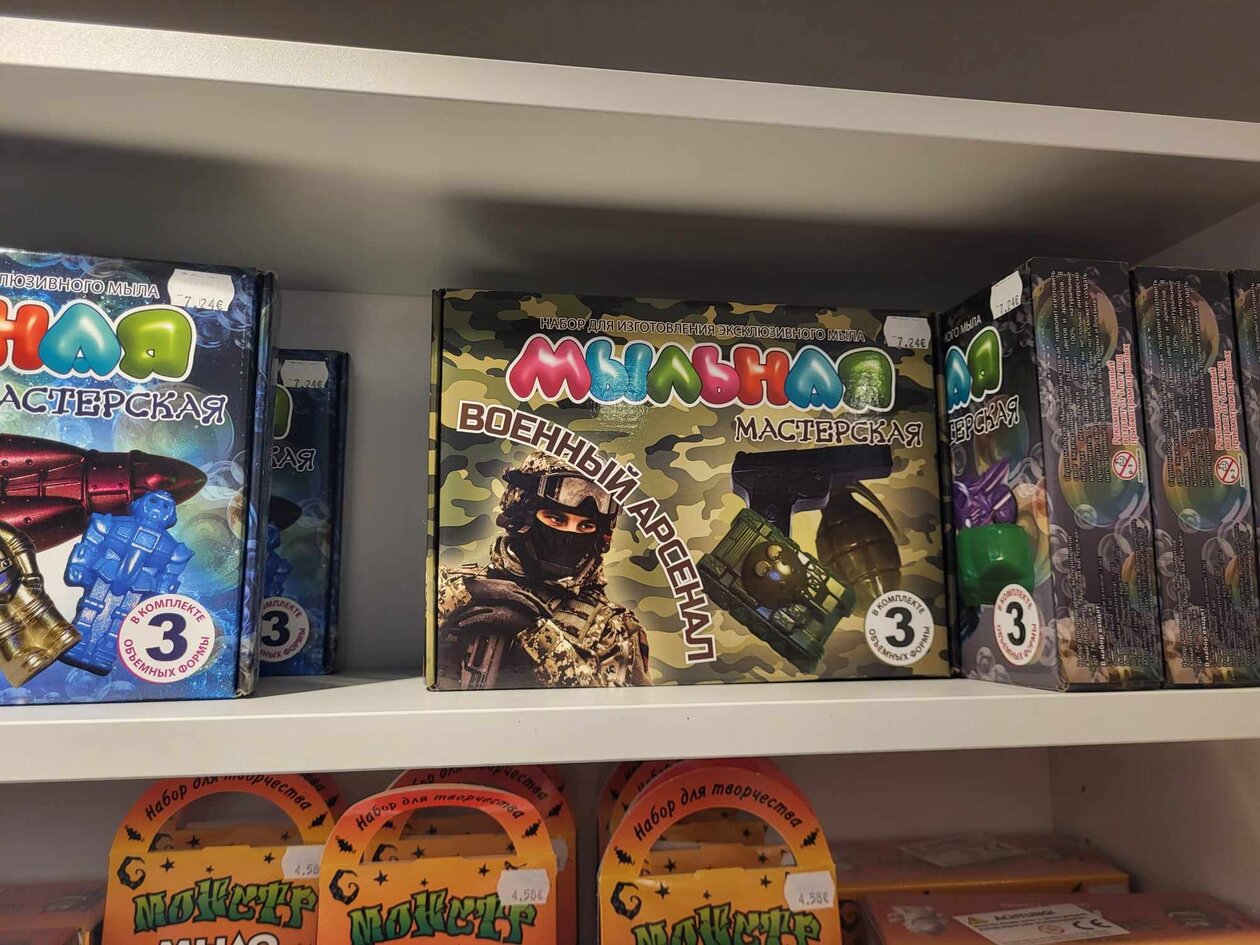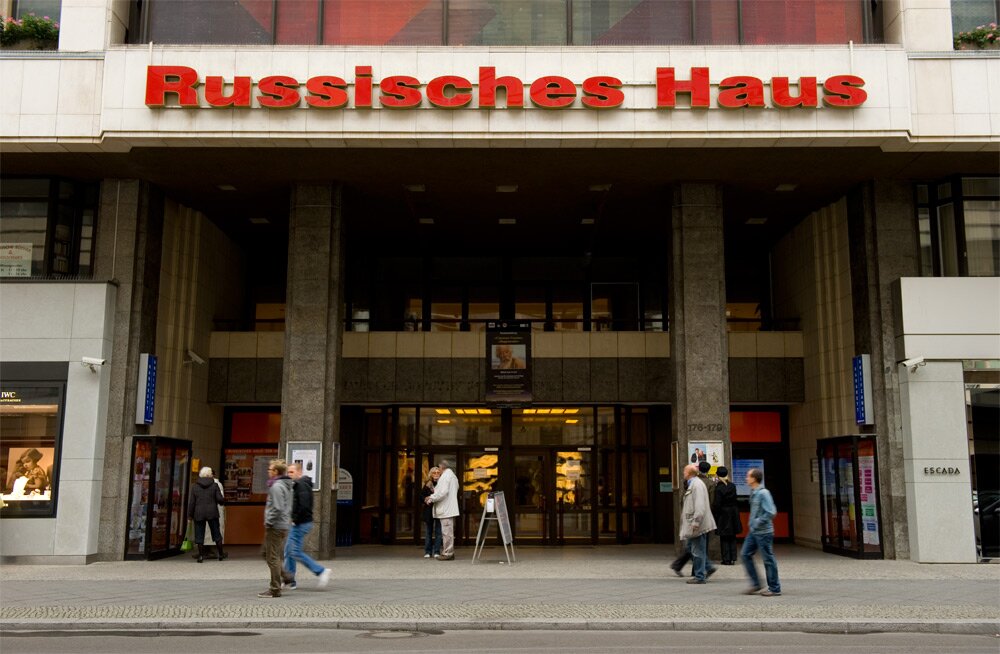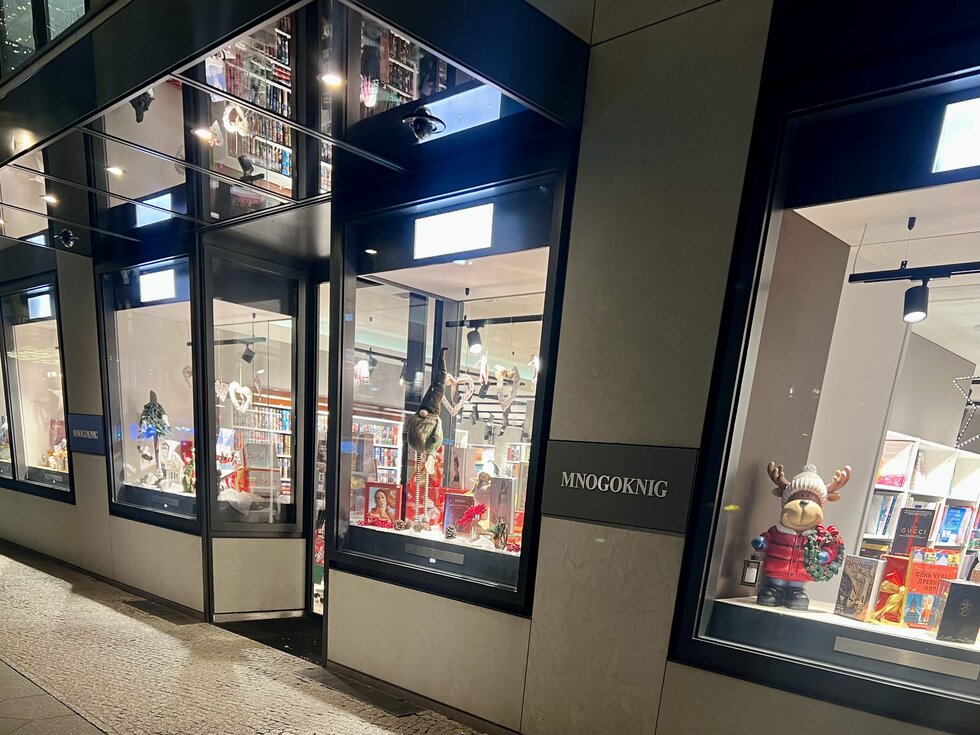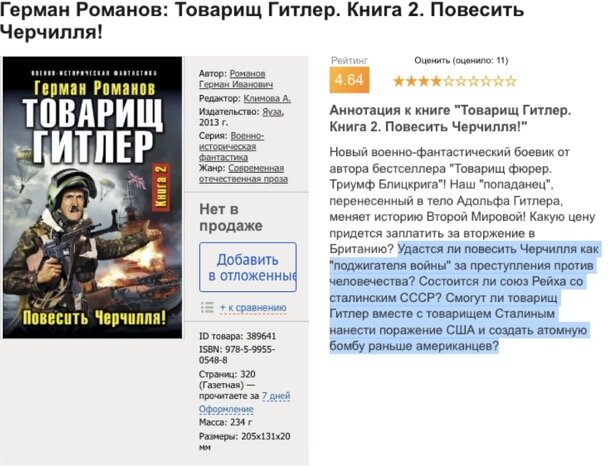Propaganda at a Prime Location
"Exclusive soap-making kit to with three 3D molds." The camouflage-colored box box depicts the molds of the "soap-making workshop" for children – a hand grenade, a pistol and a Russian-style tank – alongside a picture of a masked soldier. He looks like one of those soldiers who occupied Crimea 10 years ago and are now murdering and raping their way through Ukraine. The children's kit costs €7.24, an easy gift choice. You can buy it in Friedrichstraße in the center of Berlin, in the bookshop in the Russian House, Russia's largest cultural institution abroad. This bookshop opened in December 2023 in a prime location in Berlin, and that alone makes it exceptional. While other European countries were closing down institutions of Russian influence under pressure from the authorities and the public, the "cultural embassy of Russia in the heart of Berlin", as the Russian Foreign Ministry praises the Russian House, was only just beginning to flourish.

Picture author: Nikolai Klimeniouk
Designed by East Berlin architect Karl-Ernst Swora for the Association of Soviet Societies for Friendship and Cultural Relations with Foreign Countries, the building was inaugurated in 1984. With 29,000 square meters of floor space and a 1,700-square-metre entrance hall, the block was not designed to blend in with its neoclassical surroundings, but to evoke the contemporary representative buildings of the Soviet Union. After the collapse of the USSR, the building came under the management of the Russian government agency Rossotrudnichestvo in 2008 following a series of reorganizations.* The agency's main task is to keep "compatriots" living abroad, i.e., the Russian-speaking diaspora and people with roots in the former Soviet Union, connected to Russia. For a long time, the "House of Science and Culture", as it used to be called, remained above all a reserve of post-Soviet dreariness. The entrance hall was filled with dust and the atmosphere of a Soviet canteen. The program of events included tried-and-tested themes such as space travel, 19th-century classics and paeans to Russia’s boundless landscapes. Those who didn't mind the mustiness could take a course of Russian or attend film screenings. In October 2022, for example, the Russian House showed Holocaust: Threads of Memory, a documentary film produced by the Russian state television channel RT, that among other things vilifies Ukrainians as Nazis. After the Russian invasion of Ukraine in 2014, a photo exhibition produced by Rossiya Segodnaya (Russia Today), the media company to which RT belongs, had a similar thrust. The exhibition featured images of alleged crimes committed by the Ukrainian army against the country’s civilians. Blatant propaganda was a natural part of the program at the Russian House.
In July 2022, the European Union introduced sanctions against the Russian government agency Rossotrudnichestvo. The justification for the sanctions states that the agency is the Kremlin's main tool for exerting hybrid influence and spreading historical revisionist narratives. Rossotrudnichestvo consolidates the activities of pro-Russian actors and works specifically to reinforce the perception of the occupied Ukrainian territories as Russian territory. It was therefore to be expected that the Russian House, run by Rossotrudnichestvo, would be closed down immediately. But nothing happened. Ukrainian activists organized protests and pickets, and in the spring of 2023 a former member of the Bundestag, Volker Beck (Alliance 90/The Greens), filed a complaint for violation of the Foreign Trade and Payments Act. The Berlin public prosecutor's office opened an investigation, but closed it in September because the accused had diplomatic status. Beck filed a complaint, which has so far remained unanswered. It is unlikely to have any consequences: when asked by the regional public broadcaster RBB, the German Foreign Office had already ruled out the possibility of taking any action against the Russian House. One of the reasons for this decision could be that Russia could retaliate by closing the three remaining offices of the Goethe Institute in Russia. Their actual activity has already been limited to offering course of German language to the visitors. On paper, however, the Russian-German agreement on the activities of cultural and information centers, signed on 4 February 2011, makes no distinction between the activities of the Goethe Institute and Russian propaganda outposts.

Picture author: Sven Wolter
Closed for several months at the beginning of the war in Ukraine, the Russian House intensified its activities since autumn 2022.** It also got a fancy new website in a style inspired by the Russian avant-garde of the 1920s. The German Marxist newspaper Junge Welt was jubilant: "An international community of volunteers meets in the Russian House with its Kandinsky look and angular Bauhaus lines"; "Russian is one of the most important languages in the world"; "as a cultural language with its rich literature, it is already one of the greatest treasures". This view of the German ultra-left is also shared by the Committee on Eastern European Economic Relations. In a letter to the Bundesbank, its executive director, Michael Harms, called for sanctions against the Russian House to be lifted. He claimed that its activities also provided "educational opportunities for declared opponents of Putin".
There are about 300,000 people in Berlin whose mother tongue is Russian. Yet until recently there were no Russian bookshops in Berlin, apart from one rather odd-looking second-hand bookshop. In September 2023, the bookstore Babel opened near Mauerpark, offering a carefully curated program of contemporary literature, non-fiction and publications by small independent publishers. Babel is also a meeting place for like-minded people. But its monopoly did not last long. In October 2023, the director of the Russian House, Pavel Izvolsky, announced his intention to open a bookshop. The bookshop opened in December. It is called Mnogoknig, which translates as "many books". It is part of a Russian chain of bookshops based in Latvia. The previous tenant, a luxury watch boutique, left the bookstore with expensive chandeliers and glamorous windows. They now display art books and luxury editions of classics, Sunzi's Art of War and a forgotten price tag of €27,350. It all looks peaceful and sophisticated, until you look closer: the range is largely made up of classics, light fiction, self-help books and pop psychology. "The range is hardly different from that offered by a bookshop in Russia," says Felix Sandalov, who used to run an independent publishing house in Moscow and now runs a support association for independent publishers in Berlin. What is noticeable, however, is the lack of good children's books from small publishers, which are the real bestsellers in the Russian book trade.

A Russian House bookstore in Berlin
There is no shortage of other books for children. In addition to Soviet classics, there are brand-new books, such as From Moscow to Berlin, which is part of the Great Children's Library series, which introduces young readers to Soviet propaganda myths about the Great Patriotic War, a Russian term for World War II. One of these myths, about the 28 Panfilov heroes, became a major political issue in 2015 when the head of the Russian State Archives published documents proving that the famous deed was based solely on the imagination of overzealous propagandists. He was subsequently sacked. The then Minister of Culture, Vladimir Medinsky, fumed: "Those who dig around in the history of 1941 with their dirty, greasy fingers should be sent by the time machine to the trenches of that time with a hand grenade against fascist tanks". What the Kremlin ideologist had in mind ultimately outlines the structure of one of the most popular genres of Russian trash literature, the so-called accidental travel or popadantsy. The name comes from the verb "popadat", or "to be catapulted into". In popadantsy stories, the characters find themselves in the past and use their knowledge of the future to help correct the mistakes of history. In most cases, this involves making the Soviet Union even more powerful, saving it from collapse and preventing the West from dominating the world. This is also true of the time travellers who venture into the distant past, for example to Kyivan Rus'. Popadantsy's works are well represented in the Friedrichstrasse bookshop, most of them by prolific authors who are completely unknown outside their fan bubble.

A typical "Popadantsy" book in Russian language: alternative history with an alliance between the USSR and Adolf Hitler against the UK.
One of the shelves displays a collection of works by Zakhar Prilepin. At first sight, this is nothing out of the ordinary about it; Prilepin’s books are also available in German bookshops. But the award-winning writer has become one of the main ideologues of the Russian war against Ukraine and was even promoted to deputy commander of an irregular unit of the Russian army in the occupied Donbass region of Ukraine. Natalia Smirnova, the owner of the Babel bookshop, regards Prilepin as a symbol of social division. In an interview with a Russian exile media outlet, she explains: "The question of whether we have books by Zakhar Prilepin has been asked repeatedly. This shows that our audience is exactly as we imagined it: against Putin and against the war". As well as books by Prilepin, Mnogoknig stocks twelve by the arch-reactionary Soviet nostalgist Yuri Polyakov. One of his books is called Soviet Childhood, a book about the glorious past. The book's cover offers the reader the prospect of "looking at life in Moscow in the distant year of 1968 through the eyes of a twelve-year-old Soviet boy ... awaiting the arrival of a bright communist future". The author masterfully reconstructs, down to the smallest detail, this long-dead world with its selflessness, its sense of comradeship, its sincere belief in justice, goodness and equality, despite the occasional shortcomings that still exist". At the same time, Mnogoknig also sells Anne Applebaum's Gulag, bestsellers by oppositional authors, and there is a corner with queer literature for young people. In Russia, the distribution of such literature has recently become a punishable offence. Apparently, the strange mixture of historical revisionism and glorification of war is to be normalized as "just an opinion" – with the connivance of the German authorities and in the middle of Berlin.
This article was written for and first published (in German language) in the Frankfurter Allgemeine Zeitung.
Corrections:
* The originally published version stated: 'After the collapse of the USSR, the building came under the administration of the Russian government agency Rossotrudnichestvo'. In fact, the Union of Soviet Societies for Friendship and Cultural Relations with Foreign Countries became the Russian Association of International Cooperation in 1992; it was renamed the Russian Centre for International Cooperation in 1994 and finally transformed into Rossotrudnichestvo in 2008.
** The orginally published version stated: 'The Russian House was closed for several months during the prosecutor's investigation. However, as soon as the investigation was closed, the Russian House immediately resumed its activities.' This is not correct. In fact, the Russian House was only closed until September 2022; the closure had nothing to do with the investigation that took place later. The author apologizes for this error.